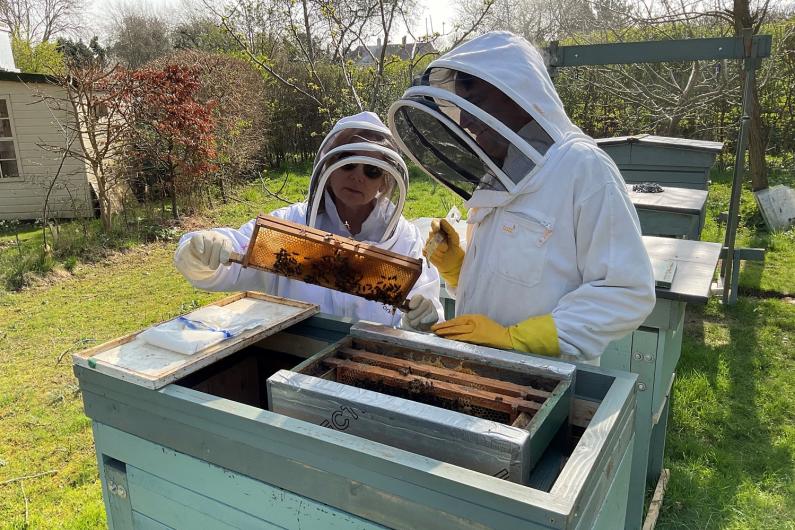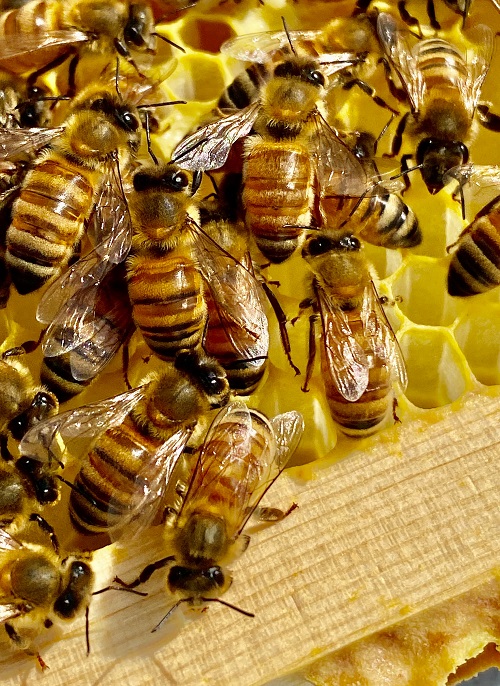
Bees don’t just provide honey, we rely on bees and other insects to pollinate most of our fruit and vegetables – did you know they pollinate nearly three quarters of the plants that produce 90% of the world’s food?
Humans simply wouldn’t survive without our busy bees, so it’s vitally important to raise awareness and celebrate World Bee Day, Friday, 20 May. This international day was started in Slovenia, a nation of beekeepers where beekeeping enjoys an equal status to that of other types of agriculture. It is celebrated in May – springtime in the northern hemisphere when nature bursts into bloom and honey bees come out, and it’s autumn in the southern hemisphere when the honey season starts.
Councillor Steve Jarvis, Executive Member for Environment and Leisure, said: “Although honey bee colonies are faring better than other types of bee, bumblebees and solitary bees as well as other pollinators are in decline on a global scale as they face many threats, from climate change to increasing habitat loss and the use of toxic pesticides. We’re happy to celebrate World Bee Day and raise awareness of the great work taking place in the district to encourage these vital insects.”
There are a number of local bee initiatives in North Herts:
A bee/insect hotel was installed by the council in Howard Gardens in Letchworth about eight years ago, near to the bowls pavilion and green – it’s thought to be one of the biggest locally.

BuzzWorks is a non-profit making, educational voluntary group, that helps people discover and enjoy the world of bees and trains people in the craft of beekeeping. Founded in 2007, the initial BuzzWorks Discovery Centre was funded through a number of grants from North Herts Council and local businesses, and comprises of a bee-friendly garden, bee school and courtyard, situated on the edge of Old Hale Way allotments on the outskirts of Hitchin.
Following its success, the council allocated a larger piece of disused land at the nearby allotments in Burford Way, for a community garden, working apiary and beekeeping training centre. BuzzWorks is unique in the eastern region, in running community beekeeping where the bees and equipment are communally owned by the charity, and in terms of size and council support.
Robin Dartington, President of BuzzWorks Association Hitchin, said: “Honey bees are integral to our way of life, without them humans couldn’t survive on the planet. They live in huge families known as colonies and carry out much more pollination than other species of bees. Keeping bees is also a fascinating hobby, we welcome interested visitors and new volunteers.
“Bees do swarm as their way to reproduce as colonies – if you ever see a swarm hanging in your garden or on a wall, please contact the council or John O’Conner, the council’s ground maintenance contractor. They will arrange for the bees to be rehomed. Don’t worry, when the bees are hanging together like this they are not aggressive and of no risk to passers-by.”
BuzzWorks will have a stall at the Eco Day at Hitchin Marketplace on Saturday, 14 May. For more information visit: BuzzWorks.
North Herts Beekeeping Association (NHBKA) has almost 150 members with apiaries of hives for honey bees across the district. Many members don’t have gardens of sufficient size to keep a number of hives, or neighbours accommodating enough to allow them to keep bees at home!
The aims of NHBKA are to encourage members of the public to be tolerant of bees and to plant bee-friendly gardens, and more specifically to promote the craft of beekeeping, encourage good practice and train beekeepers and others who wish to safely keep honey bees. They can also arrange for bees to be rehomed if you come across a swarm hanging in your garden or on a wall.
For more information visit: North Herts BKA.
Top tips for welcoming bees and wildlife to your garden:
- Plant flowers, shrubs and trees in your garden – even pots on patios and hanging baskets help
- Don’t use pesticides
- Use peat-free compost to save wildlife habitats
- Let your grass grow to give bees and other insects shelter (and a nice place to roam!)
- Buy or build a bee or insect hotel.
Get the latest news by email
You can subscribe to get news and service updates by email. It's free, you can choose which topics you’re interested in and you can unsubscribe at any time.